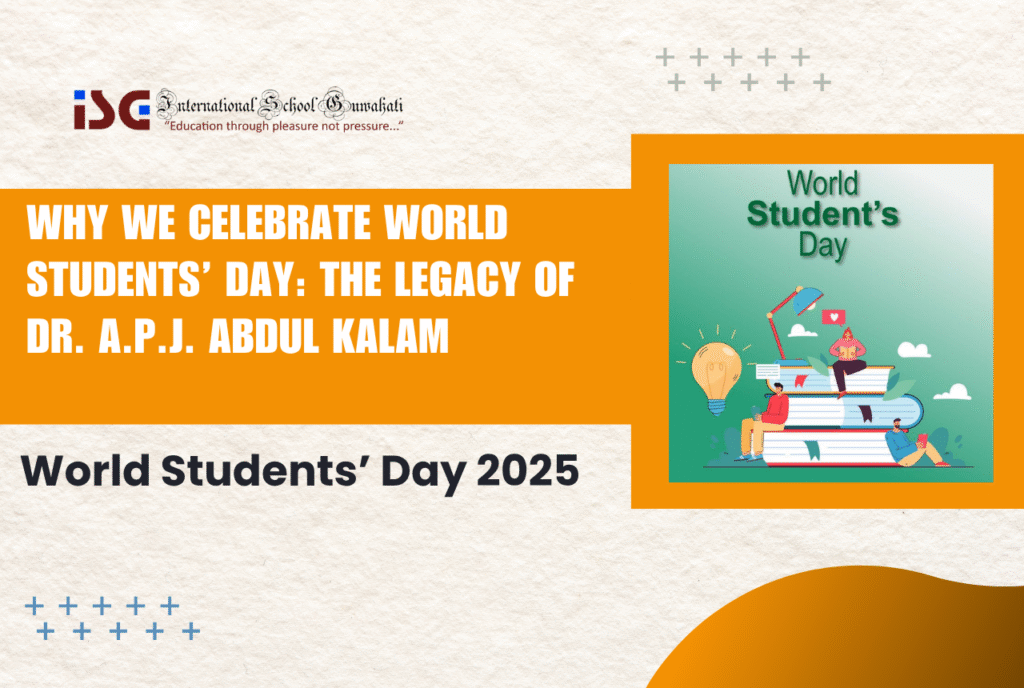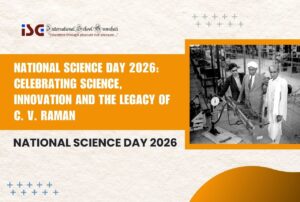October 15 is celebrated globally as World Students’ Day, a warm tribute to the spirit, imagination, and boundless potential that students bring to our world. It is a day that sends us a reminder of the strength of young minds—their aspirations, their grit, and their power to make the future. However, more than honoring students, this day holds greater significance. It pays tribute to the life and legacy of India’s greatest inspirational figure, Dr. A.P.J. Abdul Kalam, whose dream continues to inspire millions to this day.
Popularly referred to as the “People’s President” and the “Missile Man of India,” Dr. Kalam was not just a scientist or a statesman—he remained a teacher at heart. His path from a small town in Rameswaram to the Rashtrapati Bhavan is one of perseverance, humility, and unwavering belief in education. He was convinced that the real power of a nation rests in the hands of its youth, and he spent his life encouraging that power.
The Significance of World Students’ Day
World Students’ Day, observed annually on October 15, was formally adopted by the United Nations in 2010 to pay tribute to Dr. A.P.J. Abdul Kalam’s service to education and the growth of young people. The unique day focuses on encouraging students’ learning, curiosity, creativity, and innovation. Educational institutions, schools, and colleges across India organize seminars, workshops, competitions, and educational camps to inspire students to think creatively, excel in their studies, and develop their leadership skills. By marking this day, teachers and students honor Dr. Kalam’s belief in empowering young people through education and knowledge.
Dr. Kalam’s Vision for Youth and Students
Dr. A.P.J. Abdul Kalam, popularly called the Missile Man of India, firmly believed that students are the backbone of the nation. He devoted his life to inspiring young minds, advancing education, and motivating youth to excel in life. His vision for students and youth can be encapsulated in the following major areas:
1. Innovation and Creativity
Dr. Kalam urged students to go beyond textbooks, adopt innovation, and create practical solutions for real-life issues. He felt that cultivating creativity and critical thinking in students is vital for individual development and national development.
2. Ethical Leadership
For Dr. Kalam, ethical leadership and values are essential traits in students and future leaders. He stressed moral courage, accountability, and honesty as the basis for the development of a strong and value-based youth.
3. Scientific Temperament
Dr. Kalam motivated students to study science, technology, and research with enthusiasm and eagerness. By encouraging a scientific temperament and problem-solving attitude, he encouraged youthful minds to help India’s technological and scientific growth.
4. National Development
Dr. Kalam motivated students to take an active role in nation-building. He felt that educated and capable youth are the key driving force of India’s growth, innovation, and sustainable development.
Through his bestselling books such as Wings of Fire, Ignited Minds, and India 2020, Dr. Kalam has continued to inspire, teach, and mentor successive generations of students, inculcating values of hard work, vision, and determination.
How Students Can Celebrate World Students’ Day
1. Conduct Educational Workshops
Colleges and schools can conduct workshops in innovation, technology, leadership, and STEM studies. Expert-educator interactive sessions can encourage students to question, investigate, and adopt Dr. Kalam’s philosophy of learning through experimentation and curiosity.
2. Organize Essay and Speech Competitions
Students can participate in speech and essay competitions on subject matters such as “Dreams and Aspirations” or “Dr. Kalam’s Vision for India.” These events improve leadership skills, critical thinking, and communication skills as well as foster the culture of education and innovation.
3. Community Service
Dr. Kalam used to believe in returning to society. Students can engage in cleanliness drives, tree planting, volunteering, or awareness campaigns to instill social responsibility, teamwork, and empathy, which reflects his motto of serving the nation.
4. Work on Innovation Projects
Students can develop projects for solving real-life issues, including renewable energy applications, robotics, or ecological projects. These projects stimulate creativity, problem-solving, and scientific inquiry, and enable students to pursue Dr. Kalam’s path of innovation and knowledge-led development.
The Central Role of Parents and Teachers in Student Development
Since World Students’ Day celebrates students’ achievements and potential, the role of teachers and parents cannot be overemphasized in nurturing young minds. Dr. A.P.J. Abdul Kalam never forget to accentuate the role of mentoring, care, and guidance in shaping tomorrow’s leaders, innovators, and thinkers. If parents and teachers give their children encouragement, care, and opportunities to nurture their abilities, students bloom.
Students are helped by a supporting learning climate developed by teachers and parents in many ways:
1. Discovery of Passions and Interests
Creativity and self-motivation among students are supported when they are motivated to discover and pursue their passions. This exploration forms the foundation for academic and future success along with lifelong learning.
2. Fostering Critical Thinking Skills
Parents and teachers are responsible for developing critical thinking and problem-solving skills. Through asking questions that inspire thinking and encouraging curiosity, they prepare learners with the necessary skills to handle problems of everyday life.
3. Encouraging Innovation and Creativity
Dr. Kalam believed that young minds were capable of thinking up innovative solutions to society’s most vital problems. For brilliance, students can be motivated by their teachers and parents to think creatively, experiment, and take calculated risks.
In short, teachers and parents are the guiding lights that make students realize their fullest potential. By providing a nourishing and inspiring environment, they ensure that the next generation possesses the information, skills, and mindset to make a huge impact on the world.
Conclusion
World Students’ Day, celebrated on October 15, serves as a powerful reminder of Dr. A.P.J. Abdul Kalam’s remarkable legacy in education, science, and youth empowerment. This day not only honors the life and achievements of the Missile Man of India but also emphasizes the importance of motivating students, fostering creativity, and promoting innovation among young minds.
By celebrating World Students’ Day, educators and institutions encourage students to dream big, develop leadership skills, embrace scientific thinking, and contribute to national development. Dr. Kalam’s teachings continue to inspire millions of students to pursue academic excellence, ethical values, and technological advancement.








